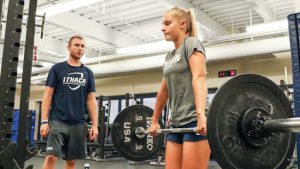
6 Types of Trainers and What You Should Know Before Buying
Chances are, when you think of the term fitness trainer, the idea that comes to mind is a very fit person with tightly fit clothes that accentuate their body type, standing there with you one on one and instructing you on what to do.
They may have a decent Instagram following, with their profile showing a series of posts with either themselves, or clients doing some intense crazy looking exercise.
Based on the current culture of fitness and training, and the constant stream of information (not excluding “misinformation”), it is not hard for the image to be etched into your head.
You may think the same about “sports performance” trainers. You might be a parent and you know that your child needs a little more guidance to excel on the field.
What the school is offering is not enough.
The unfortunate thing about today’s culture of training is that ANYONE, and I mean anyone, can put a few drills together and call themselves a coach or trainer.
There are levels to effective trainers.
Some just cluster random exercises together just to make you sweat. Others have a training system that make up the fabric of a true training program, while a good amount just put together drills based on what they did when they were athletes.
Here are a few types of trainers, characteristics, and what you should look out for before making your investment.
The “Side Hustler”
The Side Hustler is the trainer who has a decent reputation in the local community for training people who want to get in shape, and usually operates on a per session transactional basis. They may only charge $10-$30 per session, and are often not that strict on pricing, willing to bend to help people because they need the business.
They may have logo they had created and put on a few shirts and either give or sell to clients to wear.
The Side Hustler has a full time job already, but kind of fell in to training after they themselves went through some type of transformation, or were some kind of athlete in the past, and wanted to stay active and generate income in the same arena.
The “Side Hustler” get’s most of their knowledge maybe from a 1 day certification course they took, and most likely YouTube videos or “fitness influencers” the follow on social media.
They have business cards they made on vista print and usually have a free session promo.
The type of clients they typically attract are people who don’t have really any exercise history, so any type of movement will benefit them, allowing results to happen more quickly because they lack a training past. And due to the lack of exercise history, the quicker results they get establish a trust in the trainer and they often refer friends.
They are also the type of clients who won’t commit long term financially, so a per session transaction works best for them, so they can pay cash to the trainer.
The Side Husting trainer usually never becomes more than that because they limit themselves in their pursuit of real exercise science, creating workouts verse programs, and not really dedicating themselves to financially growing a business, being satisfied with the untaxed earnings.
They typically run bootcamps outside or are “mobile” trainers who travel to you.
However, you HAVE to start somewhere, and beginning with the Hustle mentality isn’t negative, unless you choose to stay at that level.
The Local Former Athlete “So Train Like Me” Coach
This type of coach has a lot in common with the Side Hustle Trainer.
He usually has some form of high school or collegiate athletic experience with some success, caters to younger athletes who played his sport.
He is big on advertising himself as a “speed and agility” coach and iterates to athletes and parents about “footwork drills”.
His Instagram feed is usually of kids doing some type of flashy footwork drills, running with parachutes, pushing a sled, and sprint drills with subpar form with over the top encouragement from the coach.
Because the coach is not established yet, you will mainly catch these sessions being done on an open field, high school field, or a public park.
This coach will have basic equipment like the bright yellow ladders, the orange disc cones, the minibands or side winder bands that attach to the ankles or thighs and small sleds and or parachutes.
They often have their athletes try to mimic the exact movements and motions done in their sport, and just add resistance in some type of way.
The “Train Like Me Coach” makes every session over the top, tiring the kid out every single time, making them feel like they worked.
You will hear them say cues like “DRIVE YOUR FEET” or “DRIVE YOUR KNEES” while the kid is doing the drills.
They typically attract the parent whose young kid is in sport and is a decent athlete, and think more work will get their kid all county.
OR it will be the parent who wants their kid to do sports but would prefer them to be around a young energetic coach that will motivate them.
The parents often say key words like “he needs to improve his footwork”, or “he needs to get faster” and are really attracted to the fact the trainer has ladders, and is yelling, making them run with parachutes, and pushing sleds. The parents love seeing this but are typically not well versed in what a true speed development program should look like.
The “Train Like Me Coach” MAY have a certification or 2, but heavily banks on his athletic experience to sell clients on.
It is usually a pay per session basis, taking cash, or Cash App every session, but may have a “package” deal” with a slight discount.
Lastly they may also be apart of Advocare or Herbalife and sell you on the performance supplement.
While their playing experience definitely gives the “Train Like Me” Coach an advantage as far as insight and talent recognition, it is a set back because almost ALL of the time, they try to fit the athlete into the program instead of the programming to the athlete. It is a “do what I did” and you will get better mentality.
Their pursuit of knowledge will come only from Youtube and watching pro athletes do drills
Each athlete is different, and deserves a unique approach.
They tend to do best with athletes who are already genetically inclined to succeed, or with heavy training or athletic backgrounds. This is because they have higher thresholds, and can do more. Their workouts normally are not sustainable for athlete or clients who are outliers to that threshold.
This type of trainer will usually take on general fitness clients and advertise “Train like an Athlete”, and have adults going through the same intense motions.
The Certified Trainer
 This type of trainer has demonstrated a thirst for knowledge.
This type of trainer has demonstrated a thirst for knowledge.
They have demonstrated a curiosity and want to really take the steps to separate themselves from the herd by earning a badge from a training organization, and tilt the gauge from just training people to running a training business.
Ripe for learning, they are ready to apply exactly what they took from the certification course and apply it to their growing training clientele.
Because there are so many different types of certifications, these trainers will come in all different forms.
You have the newly certified trainer who will work with any and everyone as their business is getting off of the ground, or the trainer who purports to only working with athletes, so their certification may be geared more towards “athletic development”.
Here is the thing; not all certifications are created equal.
Some are more in depth than others.
Some certifications are extremely basic and can be completed in a few hours or over a single weekend.
Obviously you can not learn everything about training in a few hours over a weekend.
So what are the pros and cons of a certified trainer?
Pros:
Someone who invests in their education demonstrates that they have started to take their profession seriously. They want to become better so they can better serve their clients, and this is always a positive.
Potential Cons:
Note the word “potential” here. There are no automatic cons because it is very situational.
One major drawback to the certified trainer is if they STOP the education process after getting a certification or two.
No certification is complete with ALL of the knowledge a training professional needs to know. Science is evolving each year. New research gets published every year.
By the time you’ve gotten your certification, new knowledge relevant to your training niches has been realized. It is up to the trainer to constantly evolve.
If you believe ALL of your knowledge is finished after just one certification, then you will inevitably fall behind.
Taking the step towards your education and acquiring a certification is a GREAT step!
The Exercise Science Graduate
This type of trainer is usually fresh out of college and looking for a career in the field of training and or strength and conditioning.
They might be more interested in working with athletes in a team setting or seeking a career as a strength and conditioning coach on the high school, collegiate, even professional level.
They are typically fascinated with the science and biomechanics of training/exercise and eager to implement the knowledge acquired over 4 years of schooling.
While in pursuit of the career they want, the exercise science graduate might take on part time training jobs either at gym or start their own clientele. They are more educated than most and have a perceived higher trust value than most trainers in similar landscapes. Because they are familiar with how the body/exercise interaction works, they are normally more astute at “creating programs”.
They take pride in delivering a service.
Without going too far down the rabbit hole, some graduates have more educational stamina than others, as in, really wish to continue their pursuit of knowledge well after school, while some leave it at the graduation podium.
This would be no different than the Certified Trainer who quits learning after receiving their certificate.
Pros:
The educational background is a plus. They “should” have a thorough knowledge of anatomy, training science and the ability to apply.
They are younger typically and eager to get right in the field and apply what they have learned. Exercise Science Graduates can be EXCELLENT trainers in the field.
Potential Cons:
If they lack curiosity, then they will be stuck in the text book mindset. The “text book” mindset is literally trying to fit everything they learned in the textbook to everyone in every scenario. They are rigid in terms of fitting the programs to different populations because they swear by the book.
The FitFluencer
The Fitfluencer is someone who derives most of their business from social media.
They normally leverage their physical looks to “influence” followers to train and look like them. Essentially, the mentality is “I’m in shape, therefore I know how to get you in shape no matter who you are!”
You will most likely find them featuring themselves on posts showing off their bodies, and saying keywords like “Bigger Butt”, “Better Bench Press”, “Toned Thighs”, or “Tighter Tummy”
Then they might have some type of “Virtual Coaching” packages with “Meal Plans” available with a link.tree button on their profile and listing their “services”
Let’s get right to it.
Pros:
They can be motivation. Superficial or not, they do have a tendency to make people take action. After all, they have developed good “marketing” skills.
Cons:
Tend to Lack of any true knowledge of training. Some might say they sell dream and are only marketing driven. FitFluencers don’t understand that the majority of the world cant and will never look like them.
Since they are leveraging only how they look, then the reality of it is there is only a small window of time they can position themselves that way. Age happens. Bodies change. And if FitFluencers are not coupling their looks with advancing their knowledge, then they will fetter off just like the majority do.
The Consummate Training Professional (We will label them CTPs for brevity)
This is the Penultimate type of training professional that someone should want to work with. This type of training professional is typically full time and is in the career of training.
Here are characteristics of a CTP:
They are well researched and have an obsessive almost curiosity about the science of what they do. CTPs are ALWAYS learning and have an almost insatiable appetite for training education.
Their knowledge does not stop at a single certification. They understand that the knowledge in the industry is not finite, and training mastery requires a constant pursuit of self improvement and knowledge.
CTP’s are always attending clinics, workshops, avoid following “FADs” and also accept that they may not know everything and don’t overstep boundaries of different disciplines. In fact, they often collab with trustworthy professionals of other disciplines to further enhance what they do and create networks.
If they don’t have the answer to a specific question, they are not afraid to say “I am unsure, but I will do some research and find some potential answers.”
CTP’s typically do not pull all of their training knowledge from superficial sources like social media or Youtube. They gravitate towards trusted sources like published research, credible literature, and other experts in the field.
CTP’s know their value and what they have to offer and their pricing reflects this, so they will not always be in everyone’s budget. They also look the part, educate others, communicate, and truly run a professional business with standards in place.
A significant indication that you are working with a true CTP is that other people in the field tend to want to learn from them and seek their wisdom or advice on various topics.
They have solidified themselves as experts.
********
In reality, we could have distinguished even more within each group of training types. Further, the line separating each isn’t necessarily cut and dry. For example, there is nothing wrong with leveraging social media to grow your business of you have CTP traits.
It is perfectly fine if you are just starting out and have to attract any and everybody into you business until you get off the ground. There will be overlap on occasion.
Hopefully before you invest in your own health and fitness development, you keep these characteristics in mind and understand what type of professional you might be working with.



